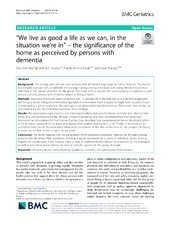| dc.contributor.author | Fæø, Stein Erik | en_US |
| dc.contributor.author | Husebø, Bettina | en_US |
| dc.contributor.author | Bruvik, Frøydis Kristine | en_US |
| dc.contributor.author | Tranvåg, Oscar | en_US |
| dc.date.accessioned | 2019-12-18T09:25:55Z | |
| dc.date.available | 2019-12-18T09:25:55Z | |
| dc.date.issued | 2019-06-06 | |
| dc.Published | Fæø SE, Husebø BS, Bruvik FK, Tranvåg O. “We live as good a life as we can, in the situation we’re in” – the significance of the home as perceived by persons with dementia. BMC Geriatrics. 2019;19:158 | eng |
| dc.identifier.issn | 1471-2318 | |
| dc.identifier.uri | https://hdl.handle.net/1956/21169 | |
| dc.description.abstract | Background: The coming years will see more persons with dementia living longer at home. However, “the home” is a complex concept with a multitude of meanings, varying among individuals and raising ethical and practical dilemmas in the support provided for this group. This study aims to increase the understanding of experiences and attitudes among persons with dementia related to living at home. Methods: Qualitative interviews were conducted with 12 persons, 69 to 89 years old, with a dementia diagnosis and living at home. Using a hermeneutical approach, the interviews were analysed as single texts, as parts of a set of texts and as a whole single text. The writings of care philosopher Kari Martinsen on “The home” were chosen as a framework for the theoretical interpretation of the findings. Results: The participants experienced a vital interconnectedness between the home and their lives, placing their home as a core foundation for life. Through stories of persisting love, they illuminated how their lived lives functioned as a foundation for their homes. Further, they described how progressing dementia disturbed rhythms of life at home, forcing them to adapt and change their routines and rhythms in life. Finally, in the hope of an enhanced future home the participants showed an acceptance of, but also a reluctance to, the prospect of having to move out of their homes at some future point. Conclusion: The study suggests that the participants’ home generated existential meaning for the participating persons with dementia. Their experience of being at home was based on a variety of individual factors working together in various ways. These findings imply a need to understand what factors are important for the individual, as well as how these factors interact in order to provide support for this group of people. | en_US |
| dc.language.iso | eng | eng |
| dc.publisher | BioMed Central | eng |
| dc.rights | Attribution CC BY | eng |
| dc.rights.uri | http://creativecommons.org/licenses/by/4.0/ | eng |
| dc.title | “We live as good a life as we can, in the situation we’re in” – the significance of the home as perceived by persons with dementia | en_US |
| dc.type | Peer reviewed | |
| dc.type | Journal article | |
| dc.date.updated | 2019-08-12T11:52:57Z | |
| dc.description.version | publishedVersion | en_US |
| dc.rights.holder | Copyright 2019 The Authors | |
| dc.identifier.doi | https://doi.org/10.1186/s12877-019-1171-6 | |
| dc.identifier.cristin | 1703495 | |
| dc.source.journal | BMC Geriatrics | |

